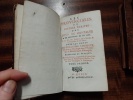-
Type
Autograph (1)
Book (52741)
Magazine (287)
Manuscript (2)
Maps (1)
New book (1)
Old papers (1)
Photographs (1)
-
Latest
Last 24h (103)
Last 3 days (46)
Last month (582)
Last week (127)
-
Language
Dutch (1)
English (28)
Finnish (1)
French (52933)
German (16)
Greek (5)
Italian (17)
Japanese (2)
Latin (20)
Polish (1)
Portuguese (2)
Russian (1)
Spanish (6)
Swedish (2)
-
Century
16th (74)
17th (201)
18th (1284)
19th (3766)
20th (22316)
21st (3768)
-
Countries
Belgium (6765)
Brazil (27)
Canada (6)
China (2)
Côte d'Ivoire (31)
Denmark (1011)
France (40018)
Germany (4)
Greece (3)
Italy (335)
Netherlands (281)
Switzerland (4551)
United States of America (1)
-
Syndicate
ALAC (6)
CLAM (5)
CNE (4)
ILAB (22550)
NVVA (1057)
SLACES (965)
SLAM (19943)
SNCAO (41)
Pensées- Texte de l'édition Brunchvicg- Précédée de la vie vie de Pascal par Mme Périer, sa soeur
Garnier Frères. 1948. In-12. Relié. Bon état, Couv. légèrement passée, Dos satisfaisant, Intérieur frais. 342 pages. Plats et contre-plats jaspés. Tranches de tête rouge.. . . . Classification Dewey : 100-PHILOSOPHIE ET DISCIPLINES CONNEXES
Introduction et notes par Ch.-M. Des Granges. Classification Dewey : 100-PHILOSOPHIE ET DISCIPLINES CONNEXES
Pascal - Molière - Musset. Essais de critique et de psychologie.
P., Alsatia, 1942, in 8° broché, 223 pages ; couverture illustrée.
PHOTOS sur DEMANDE. ...................... Photos sur demande ..........................


Phone number : 04 77 32 63 69
Les provinciales ou Lettres écrites par Louis de Montalte à un provincial de ses amis, et aux RR. PP. jésuites, sur la morale & la politique de ses pères.
Sans lieu ni date, 1709, 10 x 17, trois volumes de (4)-XIV-366-XV-(3), (2)-X-462-XVIII-(2), (2)-VIII-370-XIII-(3) pages sous pleines basanes de l'époque, - dos à cinq nerfs titrés & fleuronnés ; tranches piquetées de rouge ; gardes blanches Avec les notes de Guillaume Wendrock, docteur en théologie dans l'Université de Salzbourg en Allemagne, traduites en français. Nouvelle édition, augmentée de deux lettres, l'une de Polemarque à Eusèbe, l'autre d'un théologien à Polemarque.
Reliures usagées. Initiales d'appartenance aux gardes.
La pensée philosophique créatrice de Pascal avec une note sur la conception Pascalienne de l'amour.
P., Alcan, 1925, in 12 broché, 62 pages.
...................... Photos sur demande ..........................


Phone number : 04 77 32 63 69
La philosophie de Pascal. III : Pascal et la casuistique. Sa critique de la casuistique et du probabilisme moral.
Ntel, éd. de la Baconnière (coll. être et penser, cahiers de philosophie) 1947. Bel exemplaire brodhé, in-8, 262 pages.
OPUSCULES PHILOSOPHIQUES
Librairie Delagrave. 1959. In-12. Broché. Etat d'usage, Tâchée, Dos abîmé, Intérieur acceptable. 28 pages. Annotations en page de garde et dans le texte.. . . . Classification Dewey : 100-PHILOSOPHIE ET DISCIPLINES CONNEXES
6e édition. Publiés et annotés par Ernest Havet. Classification Dewey : 100-PHILOSOPHIE ET DISCIPLINES CONNEXES
PENSEES ET OPUSCULES PHILOSOPHIQUES (FRAGMENTS)
Hachette. 1933. In-12. Broché. Etat d'usage, Couv. légèrement passée, Agraffes rouillées, Intérieur bon état. 70 pages.. . . . Classification Dewey : 100-PHILOSOPHIE ET DISCIPLINES CONNEXES
Collection René Vaubourdolle. Avec une notice biographique, une notice littéraire et des notes. Classification Dewey : 100-PHILOSOPHIE ET DISCIPLINES CONNEXES
DES 'PENSEES' DE PASCAL A L' 'APOLOGIE'
L'Ecole. 1955. In-8. Broché. Bon état, Couv. convenable, Dos satisfaisant, Intérieur frais. 162 pages. Spécimen (perforé).. . . . Classification Dewey : 100-PHILOSOPHIE ET DISCIPLINES CONNEXES
N° 781. Textes commentés et annotés. Classification Dewey : 100-PHILOSOPHIE ET DISCIPLINES CONNEXES
"PASCAL / N°13 de la collecton ""Maitres des litteratures""."
RIEDER. NON DATE. In-8. Broché. Etat d'usage, 1er plat abîmé, Dos satisfaisant, Intérieur frais. 86 pages - 2 dechirures sur le 1er plat. Nombreuses heliogravures hors texte.. . . . Classification Dewey : 100-PHILOSOPHIE ET DISCIPLINES CONNEXES
Classification Dewey : 100-PHILOSOPHIE ET DISCIPLINES CONNEXES
PASCAL, PHILOSOPHE ET SAVANT, OPUSCULES PHILOSOPHIQUES
Hachette. 1980. In-8. Broché. Bon état, Couv. convenable, Dos satisfaisant, Intérieur bon état. 127 pages. Illustré de gravures et schémas en noir et blanc.. . . . Classification Dewey : 100-PHILOSOPHIE ET DISCIPLINES CONNEXES
Oeuvres et opuscules philosophiques, sous la dir. de Pierre-José About. Avec présentation des textes, intro. et notes. Classification Dewey : 100-PHILOSOPHIE ET DISCIPLINES CONNEXES
OPUSCULES PHILOSOPHIQUES.
HACHETTE / OEUVRES ET OPUSCULES PHILOSOPHIQUES. 1980. In-8. Broché. Etat d'usage, Couv. légèrement passée, Dos satisfaisant, Intérieur frais. 127 pages. Premier plat illustré en vert et blanc. tampons.. . . . Classification Dewey : 100-PHILOSOPHIE ET DISCIPLINES CONNEXES
Présentation des textes, introduction et notes par Michel Boy. Classification Dewey : 100-PHILOSOPHIE ET DISCIPLINES CONNEXES
Pensées de M. Pascal sur la religion, et sur quelques autres sujets. Edition nouvelle, corrigée et augmentée de beaucoup de pensées, de la vie de l'auteur, et de quelques dissertations.
A la Haye, chez Pierre Gosse, 1743. In-12 de52-[2]-[50]-266-[14]-128 pages, demi-veau moucheté, dos lisse orné de filets, roulettes et titre dorés, pièce de titre caramel, tranches jaunes mouchetées.
Belle vignette de titre, gravée. L'ouvrage s'ouvre sur "La vie de M. Pascal écrite par Mme Perier, sa soeur", suivi par "Pensées de M. Pascal sur la religion et sur quelques autres sujets, qui ont été trouvées après sa mort parmi ses papiers" et se termine par "Discours sur les Pensées de M. Pascal, où l'on essaye de faire voir quel étoit son dessein". Le Dsicours est attribué à Du Bois de la Cour, alias Filleau de la Chaise [Barbier I, 1048]. Dos un brin frotté, nom de possesseur à la plume sur garde.
"Pascal Pia etc Louis Calaferte Pierre Reverdy Alain Jouffroy Georges Duthuit Maurice Nadeau Michel Vinaver Adrienne Monnier Pierre Gascar Thomas de Quincey"
Reference : 11518
(1953)
"Les Lettres Nouvelles n°5"
"1953. Paris Éditions René Julliard juillet 1953 - Broché 14 5 cm x 22 5 cm 127 pages (pagination continue) - Directeur : Maurice Nadeau rédacteur en chef : Maurice Saillet textes et poèmes de Pierre Reverdy Pierre Gascar Alain Jouffroy Louis Calaferte Michel Vinaver Thomas de Quincey Maurice Nadeau Pascal Pia Georges Duthuit Adrienne Monnier etc - bibliographie cachet de bibliothèque bon état"
"Les grands courants de la pensée russe contemporaine - Collection "" Slavica n°4 ""."
L'Age d'Homme. 1971. In-8. Broché. Bon état, Couv. convenable, Dos satisfaisant, Intérieur frais. 93 pages - couverture contrepliée.. . . . Classification Dewey : 100-PHILOSOPHIE ET DISCIPLINES CONNEXES
"Collection "" Slavica n°4 "". Classification Dewey : 100-PHILOSOPHIE ET DISCIPLINES CONNEXES"
Pensées de Pascal, publiées d'après le texte authentique et le seul vrai plan de l'auteur.
Avec des notes philosophiques et théologiques et une notice biographique par Victor Rocher, Un des 275 exemplaires sur papier de hollande numéroté, 1 vol. fort in-4 reliure plein maroquin rouge, armes de Mgr Meignan frappée au premier plat, dos à 5 nerfs dorés orné, triple filet doré d'encadrement en plats, tête dorée, n.r., double filet doré en coupes, chasses richement ornée, rel. signée A. Mame et Fils, Alfred Mame et Fils, Tours, 1873, 1f. (dédicace spéciale à Monseigneur Meignan), LXIII-540 pp.
Exceptionnel exemplaire sur papier de hollande établi spécialement dans une splendide reliure en plein maroquin rouge, à l'attention de "sa Grandeur Monseigneur Meignan, Archevêque de Tours, en Souvenir de ses Noces d'Or, hommage très respectueux des éditeurs Alfred Mame et Fils", comme l'indique le feuillet spécial de dédicace inséré en tête de l'ouvrage. Magnifique exemplaire relié aux armes, parfaitement relié par un maître, en superbe état (grand ex-libris gravé Félix Durosier, très petit frott. sur un nerf).
Pensées sur la Religion et sur quelques autres sujets.
P., Club des Libraires de France, 1961, in 8° relié pleine toile blanche décorée de l'éditeur, 523 pages ; cachets ; petite décoloration en queue du dos.
Tirage limité et numéroté. Texte intégral des Pensées établies, classées et annotées par Jean Steinmann, accompagné de 3 portraits de Pascal et de pages manuscrites reproduites en fac-similé. ...................... Photos sur demande ..........................


Phone number : 04 77 32 63 69
Oeuvres complètes publiées avec une biographie, des introductions, des notes et des tables par Fortunat Strowski. Préface par Pierre de Nolhac. Tome I : BIOGRAPHIE - OEUVRES SCIENTIFIQUES.
1923 P., Ollendorff, sans date (1923) fort in 8° broché, CIII-434 pages ; couverture rempliée (très légèrement fanée) ; illustrations hors-texte.
Tirage limité à 135 exemplaires numérotés, celui-ci un des 100 sur vélin pur fil. ...................... Photos sur demande ..........................


Phone number : 04 77 32 63 69
Oeuvres complètes publiées avec une biographie, des introductions, des notes et des tables par Fortunat Strowski. Préface par Pierre de Nolhac. Tome III : Les PENSEES - Les OPUSCULES - La CORRESPONDANCE.
1923 Paris, Ollendorff, sans date (1931) fort in 8° broché, XXVI-488 pages ; couverture rempliée (très légèrement fanée) ; table analytique des Pensées in-fine.
Un des exemplaires sur vélin pur fil. ...................... Photos sur demande ..........................


Phone number : 04 77 32 63 69
LA FRATERNITE / extrait de la REVUE THEOSOPHIQUE FRANCAISE.
REVUE THEOSOPHIQUE. 1919. In-8. En feuillets. Bon état, Livré sans Couverture, Dos satisfaisant, Intérieur frais. 14 pages.. . . . Classification Dewey : 100-PHILOSOPHIE ET DISCIPLINES CONNEXES
Classification Dewey : 100-PHILOSOPHIE ET DISCIPLINES CONNEXES
LA REINCARNATION, OUI OU NON ?
LE CENTURION. AOUT 1987. In-8. Broché. Bon état, Couv. convenable, Dos satisfaisant, Intérieur frais. 149 pages.. . . . Classification Dewey : 100-PHILOSOPHIE ET DISCIPLINES CONNEXES
Classification Dewey : 100-PHILOSOPHIE ET DISCIPLINES CONNEXES
Pascal. Son temps et le notre.
P., A. Michel, 1949, in 8° broché, 396 pages ; couverture ilustrée (légèrement ternie).
PHOTOS sur DEMANDE. ...................... Photos sur demande ..........................


Phone number : 04 77 32 63 69
Regardons vivre Blaise Pascal.
P., Grasset, 1945, in 12 broché, 304 pages ; couverture illustrée (défraichie) ; des rousseurs et quelques salissures.
PHOTOS sur DEMANDE. ...................... Photos sur demande ..........................


Phone number : 04 77 32 63 69
L'entretien de Pascal avec M. de Sacy
Paris, PUF, études d'histoire et de philosophie religiieuses, 1966. In-8 (250x165mm) broché, 150 p. Quelques petites marques au crayon de papier (très facilement effaçables). Très bon état général.
EST-IL RAISONNABLE D'AVOIR UNE RELIGION ? ET LAQUELLE ? (QUESTIONS APOLOGETIQUES, N° 679)
Librairie Bloud & Cie, Paris. 1913. In-12. Broché. Bon état, Couv. convenable, Dos satisfaisant, Intérieur acceptable. 72 pages. Annotations et tampon de bibliothèque sur le 1er plat.. . . . Classification Dewey : 210-Philosophie et théorie
'Questions Apologétiques', n° 679. Classification Dewey : 210-Philosophie et théorie
 Write to the booksellers
Write to the booksellers














